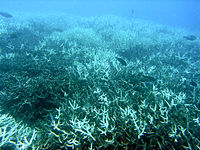
Photo from wikipedia
Coral reefs are rapidly declining because of widespread mass coral bleaching causing extensive coral mortality. Elevated seawater temperatures are the main drivers of coral bleaching, and climate change is increasing… Click to show full abstract
Coral reefs are rapidly declining because of widespread mass coral bleaching causing extensive coral mortality. Elevated seawater temperatures are the main drivers of coral bleaching, and climate change is increasing the frequency and severity of destructive marine heatwaves. Efforts to enhance coral thermal bleaching tolerance can be targeted at the coral host or at coral-associated microorganisms (e.g., dinoflagellate endosymbionts and bacteria). The literature on experimental evolution of bacteria suggests that it has value as a tool to increase coral climate resilience. We provide a workflow on how to experimentally evolve coral-associated bacteria to confer thermal tolerance to coral hosts and emphasize the value of implementing this approach in coral reef conservation and restoration efforts.
Journal Title: Trends in microbiology
Year Published: 2021
Link to full text (if available)
Share on Social Media: Sign Up to like & get
recommendations!